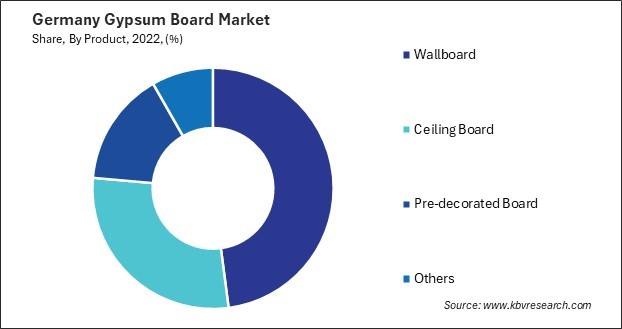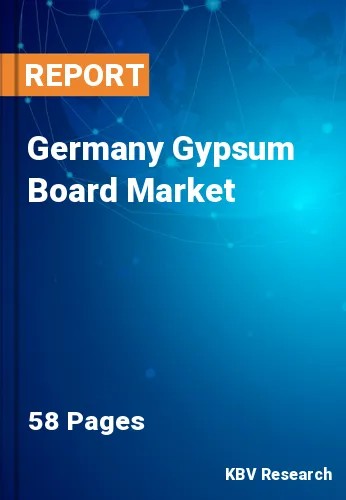The Germany Gypsum Board Market size is expected to reach $5.1 Billion by 2030, rising at a market growth of 8.1% CAGR during the forecast period. In the year 2022, the market attained a volume of 2339.7 Million Units, experiencing a growth of 7.3% (2019-2022).
The gypsum board market in Germany has experienced significant growth over the past few years, driven by various factors such as rapid urbanization, increasing construction activities, and a shift towards sustainable building materials. Gypsum board, also known as drywall or plasterboard, is widely used in interior construction due to its versatility, ease of installation, and cost-effectiveness.

One of the key drivers contributing to the growth of the gypsum board market in Germany is the country's booming construction sector. Germany has been witnessing a surge in construction activities fueled by infrastructure development projects, residential construction, and commercial real estate investments. The government's initiatives to improve infrastructure, such as transportation networks and energy-efficient buildings, have further propelled the demand for gypsum boards.
According to the Federal Ministry of the Interior and Community, in 2019, Germany's construction industry generated an output of roughly €430 billion. This thriving sector significantly impacted various segments, including the gypsum board market in Germany.
Moreover, the increasing trend towards sustainable construction practices has also boosted the demand for gypsum boards in Germany. Gypsum boards are considered environmentally friendly as they are recyclable and contribute to energy efficiency in buildings. Builders and developers in Germany are increasingly opting for green building materials, including gypsum boards, to meet stringent environmental regulations and achieve sustainability goals.
The COVID-19 pandemic has posed challenges to the gypsum board market in Germany, disrupting supply chains and causing delays in construction projects. The temporary shutdown of manufacturing facilities and construction sites during lockdowns resulted in a slowdown in production and reduced demand for gypsum boards. Additionally, uncertainties surrounding the economic outlook led to cautious spending by consumers and businesses, impacting the overall construction industry.
In recent years, Germany has witnessed a significant surge in renovation and remodeling activities within the gypsum board market. One of the primary drivers behind this rise is the growing trend towards sustainable and energy-efficient construction practices. With increasing awareness of environmental concerns and the need to reduce carbon footprints in Germany, many property owners are opting to renovate or remodel their buildings to meet modern energy efficiency standards.
Moreover, the aging infrastructure in Germany has necessitated extensive renovation efforts. Many buildings, particularly those constructed several decades ago, require updates to meet current safety, accessibility, and functionality standards. Gypsum boards offer a versatile solution for these renovation projects, allowing for quick and efficient installation while providing enhanced durability and aesthetic appeal.
Additionally, changing lifestyle preferences have contributed to increased renovation and remodeling activities. As urbanization continues to reshape residential and commercial spaces, property owners in Germany are seeking to adapt their properties to accommodate evolving needs and preferences. Whether converting old industrial buildings into modern loft apartments or renovating office spaces to foster collaboration and productivity, gypsum boards offer the flexibility required to transform spaces efficiently. Therefore, Germany's surge in gypsum board renovation and remodeling reflects a shift towards sustainable construction, addressing aging infrastructure, and adapting to changing lifestyle preferences.
In Germany, the gypsum board market is experiencing a notable surge in demand for sustainable construction materials, reflecting broader trends towards environmentally friendly practices in the construction industry. One key driver behind the growing demand for sustainability in gypsum board materials is the increasing stringency of environmental regulations.
According to the Federal Ministry of the Interior and Community, in 2019, Germany's construction industry generated an output of roughly €430 billion. German authorities have been implementing stricter standards to reduce greenhouse gas emissions and promote energy efficiency in buildings.
Moreover, industry initiatives and certifications further incentivize the adoption of sustainable gypsum board materials in the German construction industry. Certifications such as LEED (Leadership in Energy and Environmental Design) and DGNB (German Sustainable Building Council) encourage using environmentally responsible building materials and practices. Builders and developers in Germany aiming to achieve these certifications increasingly opt for gypsum boards that meet the required sustainability criteria.
Manufacturers in the gypsum board market in Germany are responding to this growing demand by investing in research and development of sustainable production methods and materials. This includes efforts to reduce energy consumption, minimize waste, and explore alternative sources of raw materials. Additionally, collaborations and partnerships within the industry supply chain are facilitating the adoption of sustainable practices and driving innovation in developing eco-friendly gypsum board products. Hence, the surge in demand for sustainable gypsum board materials in Germany is driven by stricter environmental regulations and manufacturer investments in sustainable production methods, reflecting a broader shift towards eco-friendly practices in the construction sector.

In the gypsum board market in Germany, several companies play crucial roles in meeting the demands of the construction industry and driving innovation in building materials. Knauf Gips KG is one of the leading companies in the German gypsum board market. Founded in 1932, Knauf has grown into a global player in the construction industry, offering a wide range of gypsum board solutions under various brands such as Knauf Gips and Rigips. The company's commitment to innovation and quality has made it a preferred choice among architects, builders, and contractors in Germany. Knauf's gypsum board products are known for their durability, soundproofing properties, and environmental sustainability, reflecting the company's dedication to delivering high-performance building materials.
Rigips Deutschland AG is another key player in the German gypsum board market, known for its high-quality drywall systems and innovative building solutions. As a subsidiary of the Belgian building materials group Etex, Rigips Deutschland AG benefits from the parent company's global expertise in construction materials. The company offers a diverse range of gypsum board products designed to meet the stringent requirements of modern construction projects. Rigips Deutschland AG's emphasis on sustainability and energy efficiency aligns with Germany's commitment to green building practices, making its gypsum board solutions sought after in the industry.
Another significant player in the German gypsum board market is Saint-Gobain Rigips GmbH, a subsidiary of the French multinational Saint-Gobain. With a strong presence in Germany's construction industry, Saint-Gobain Rigips GmbH specializes in manufacturing gypsum-based building materials, including plasterboards, drywall systems, and ceiling solutions. The company's extensive product portfolio caters to various construction applications, ranging from residential to commercial and industrial projects. Saint-Gobain Rigips GmbH's focus on innovation and design excellence underscores its position as a leading supplier of gypsum board products in Germany.
Gebr. Knauf Verwaltungsgesellschaft KG is also a significant contributor to the German gypsum board market. As part of the Knauf Group, one of the world's largest manufacturers of building materials, Gebr. Knauf Verwaltungsgesellschaft KG produces various gypsum board products for residential and commercial construction applications. The company's dedication to research and development ensures continuous product design, performance, and sustainability innovation, maintaining its competitiveness in the German industry. With a strong emphasis on quality, sustainability, and technological advancement, these companies are poised to continue shaping the future of the gypsum board market in Germany.
By Application
By Product
Our team of dedicated experts can provide you with attractive expansion opportunities for your business.

